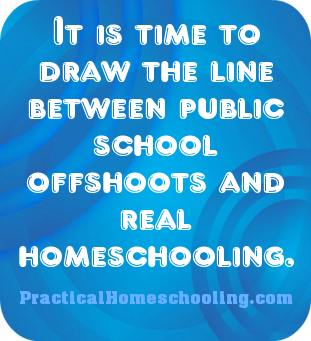 Shakespeare said, "A rose by any other name would smell as sweet." But what would happen if skunk cabbages were relabeled as "roses"? Would roses still be thought of as sweet?
Shakespeare said, "A rose by any other name would smell as sweet." But what would happen if skunk cabbages were relabeled as "roses"? Would roses still be thought of as sweet?
This is the very question facing homeschoolers today. Various financial interests are intent on labeling their state-funded educational options as "homeschooling." And this could become a bigger problem than we think.
According to the "We Stand for Homeschooling" website,
The very nature, language and essence of homeschooling are being challenged and even co-opted by a vast array of emerging educational programs which may be based in the home, but are funded by government tax dollars, bringing inevitable government controls. These new "home-based" publicly-funded entities are variously called: charter schools, cyber-charters, e-schools, Independent Study Programs (ISP), dual enrollment, Blended Schools Programs (BSP), Programs for Non-Public Students (PNPS), Public School Alternative Programs (PSAP), virtual schools, academies, community schools, home bound, and other newly devised terms and concepts.
As that article goes on to say:
There is a profound possibility that homeschooling is not only on the brink of losing its distinctiveness, but also is in grave danger of losing its independence.
The article cites stories from various sources to make its points:
- A school board member who likes "the idea of using a virtual school to reach out to families that want homeschooling for their children" and refers to it as "bringing home schooling under the state's umbrella." This should set off loud alarm bells to any of us who value our educational freedom.
- A report from the Akron Beacon Journal, which states that "educating children at home is the fastest growing element of charter schools in the state" and reveals the profit motive behind such charter schools: "While the schools receive more than $5,000 in state and local money per child, the cost is only $2,500 per elementary pupil and $3,500 per high schooler." Big bucks to be made here, by both the charter school provider and the school district.
- An Education Week article that reveals misbehavior on the part of a publicly funded charter school in Ohio. Such financial irregularities could lead to calls to regulate homeschooling, if charter schooling continues to be confused with homeschooling.
Afterschooling Is OK, But...
We at PHS have always been happy to see parents getting more involved with their children's education. The very first edition of my Big Book of Home Learning coined the term "afterschooling" to encourage parents who weren't ready for total homeschooling to spend some time teaching their kids at home.
In one sense, teaching your children at home with a public-school curriculum or a public-school online service is a step up. It certainly takes more parental involvement, and that is a good thing.
So PHS is not questioning the value of online charter schools and other arrangements that public schools make which allow families to do some or all of their teaching at home. We just don't believe they should be called homeschools.
Here is the definition of "homeschooling" from my upcoming Mary Pride's Complete Guide to Getting Started in Homeschooling (Harvest House Publishers, 2004):
You and your children work together to pick the resources - including outside-the-home classes and learning adventures - that will become your homeschool curriculum. You, the parent, teach some courses and supervise the rest.
Key to this definition is that the parents, not school authorities, are in charge, and you have the authority and ability to change the homeschool curriculum and schedule at any time. Surrendering authority and oversight to any school, tutor, organization, or individual is not homeschooling.
Who Is In Charge?
Homeschooling is about educational freedom. It is not primarily about being at home. You can homeschool on field trips, with tutors, and via online academies of your choice and paid for by you. Once a third party starts picking the curriculum and paying the bills, it's their schooling, not homeschooling.
The only homeschool association staffed by lawyers is certainly aware of this. In their own words, "Because of the degree of control that a public school system is permitted to exert over families who are in 'homeschool assistance' programs, Home School Legal Defense Association does not offer membership to these families."
The "We Stand for Homeschooling" group has it right: "Anyone who is enrolled in a publicly-funded school program, even if that public school is based in the home, is a public school student and not a homeschooler." As they go on to say:
We understand that it is pure folly to define what homeschooling is because of its diversity; nor can any one group pretend to speak for all homeschoolers. However, some educational programs can be clearly identified as NOT homeschooling. It is time to take a strong stand. Any time home education comes under "the state's umbrella" through public funding, it is no longer homeschooling. It is now public schooling.